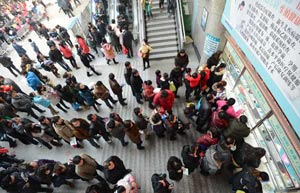On your marks, get set, spend - shopping habits, store sites change rapidly
By Shi Jing (China Daily) Updated: 2014-03-20 07:28According to a China retailing market report jointly released by the real estate service consultancy Knight Frank and global design and consulting firm Woods Bagot earlier this year, 65 percent of luxury retailers missed their expansion targets in 2013, largely because of the difficulty in finding good quality sites, the slowdown of expansion plans in the face of the anti-corruption and anti-extravagance policies and a change in strategy for internal reasons.
|
 |
 |
Christine Greybe, president of the Chicago-headquartered executive search firm DHR International, also noticed a general slowdown in the luxury retail sector with growth dropping from double digits to single digit at best and, in some cases, being flat or negative for 2013.
"This will in 2014 affect recruitment negatively at the entry and middle-management levels. However at the C level and for senior management positions there will continue to be a need for talent as the profiles of the executives change and the demands of the business change to cope with the volatility of the current China market," she said.
DHR Executive Vice-President Kelvin Ling added that 2013 was a tough year for all sectors in the consumer industry in China. Many sectors were hit by the government's policy changes such as the ban on the gift-giving habit, the economic situation in areas such as increasing rental and labor costs and changes in consumer behavior in which the fast growth of e-commerce was the most significant.
"Those affected include the luxury sector, liquor industry, mass market retailers, apparel retailers and even some of the fast-moving consumer goods companies that rely on sales to institutions during the festive seasons," he said.
The number of gifts given by rich Chinese people also fell by 25 percent in 2013, a combined result of the country's economic slowdown and Beijing's resolution to crack down on extravagance and corruption, said Rupert Hoogewerf, founder and chief researcher of the Hurun Report, which monitors the spending habits of the wealthy.
Not only are the Chinese super rich less generous these days, but most Chinese are cutting back their budgets for luxury products in general. According to Barclays Research, which looked into China's economic performance in the first two months this year, luxury products sales were quite weak even during the Spring Festival, the traditional peak season of the year when people tend to buy expensive goods as gifts.
 |
 |
- NHTSA says finds no 'defect trend' in Tesla Model S sedans
- WTO rare earth ruling is unfair
- Amway says 2014 China sales may grow 8%
- President Xi in Europe: Forging deals, boosting business
- CNOOC releases 2013 sustainability report
- Local production by Chery Jaguar Land Rover this year
- Car lovers test their need for speed in BMW Mission 3
- China stocks close mixed Monday

















